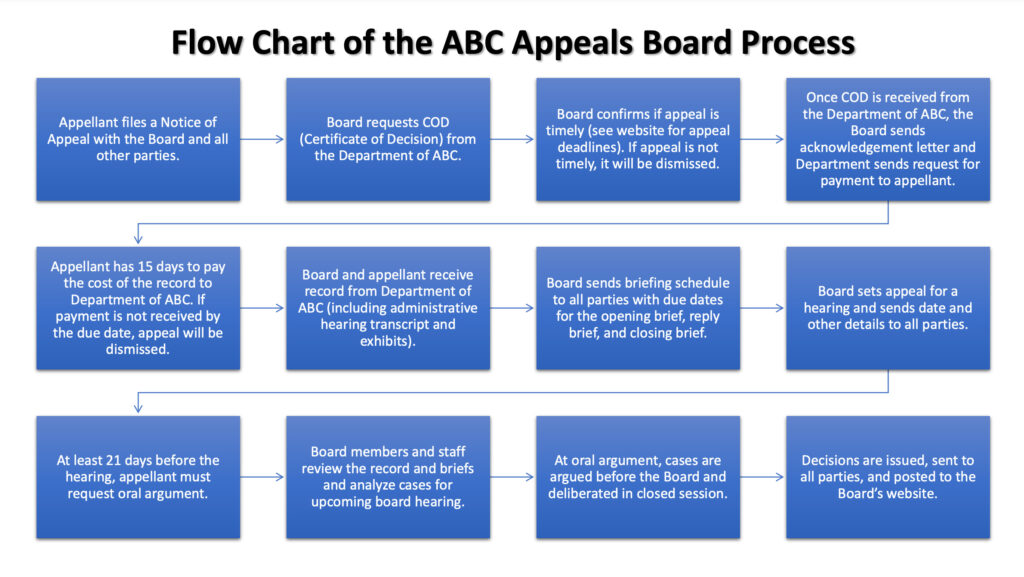Introduction
California Department of Alcoholic Beverage Control (“ABC” or “Department of Alcoholic Beverage Control”) Licensees are subject to a range of enforcement actions for various statutory and regulatory violations. Indeed, one of the three pillars of the ABC mission statement is enforcement and the Department of Alcoholic Beverage Control engages in a variety of programs to “protect the public” by enforcing the provisions of the Alcoholic Beverage Control Act. Following the enforcement action itself, if a violation is found, then the licensee is subject to a defined set of penalties promulgated within he “Penalty Guidelines” as discussed below. Then, if the licensee wishes to contest the penalty imposed by the ABC, the licensee may appeal the violation and penalty to the Alcoholic Beverage Control Appeals Board.
There are a myriad of rules which must be complied with, the noncompliance of which is subject to a process of adjudication of the violation, and if a violation is found, penalties.
In reaching a decision on a disciplinary action under the Alcoholic Beverage Control Act (Bus. and Prof. Code Sections 2300, et seq.), and the Administrative Procedures Act (Govt. Code Sections 11400, et. seq.), the Department shall consider the disciplinary guidelines entitled “Penalty Guidelines”. Deviation from the guidelines is appropriate where the Department of Alcoholic Beverage Control in its sole discretion determines that the facts of the particular case warrant such a deviation- such as where facts in aggravation or mitigation exist. (4 CCR Sec.144; see also Business and Professions Code Sec. 25570, Sec. 23001, Government Code Section 11425.50(e), and Section 22, Article II, California Constitution).
California Department of Alcoholic Beverage Control Penalty Guidelines
The California Constitution authorizes the Department of Alcoholic Beverage Control, in its discretion to suspend or revoke any license to sell alcoholic beverages if it shall determine for good cause that the continuance of such license would be contrary to the public welfare or morals. The Department may use a range of progressive and proportional penalties. Typically, this range extends from Letters of Warning to Revocation. The regulations contain guidelines of a schedule of penalties that the Department usually imposes for the first offense of the law listed. Higher or lower penalties from the below schedule may be recommended based on the facts of the individual cases where supported by aggravating or mitigating circumstances.
Aggravating Circumstances for ABC Penalties
Aggravating factors may include, but are not limited to:
- Prior disciplinary history
- Prior warning letters
- Licensee involvement
- Premises located in high crime area
- Lack of cooperation by the licensee in investigation
- Appearance and actual age of minor (if applicable)
- Continuing course or pattern of conduct
Mitigating Circumstances for ABC Penalties
Mitigating factors may include, but are not limited to:
- Length of licensure at subject premises without prior discipline or problems
- Positive action by licensee to correct problem
- Documented training of licensee and employees
- Cooperation by licensee in investigation
Penalty Schedule Imposed by the Department
Penalties for Section 25658 Violations and Other Violations Involving Minors
| Sales of alcoholic beverages to person(s) under 21 | 15 day suspension |
| Permitting person(s) under 21 to consume | 15 day suspension |
| Furnishing or causing to be furnished alcoholic beverage to person(s) under 21 | 15 day suspension |
| 2nd violation of Section 25658 within 36 months | 25 day suspension |
| 3rd violation of Section 25658 within 36 months | Revocation |
| Minor(s) on public premises-25665 B&P | 10 day suspension |
| Employment of minor(s)-25663 B&P | 10 day suspension |
| Unsupervised sales by person(s) under 18 | 10 day suspension |
Penalties for Section 25602 Violations
| Sales to obviously intoxicated person(s) | 15 day suspension |
| 2nd violation of 25602 within 3 years | 25 day suspension |
| 3rd violation of 25602 within 3 years | 45 day suspension to revocation |
Penalties for Sales and/or Consumption After Hours
| By public | 15 day suspension |
| By employees and friends only | 10 day suspension |
| By employees only | 5 day suspension |
Penalties for Licensee or Employee Not Permitting Inspection
| Of Premises | 30 day suspension |
| Of Records | 30 days and indefinite until records produced |
Penalties For Sale/Possession of Alcoholic Beverage Not Permitted By License
| Sale | 15 day suspension |
| Possession | 10 day suspension |
Penalties for Violations of Gambling Regulations
| Organized (bookmaking, football cards, etc.) | 30 day suspension |
| Local (cards, dice, football & baseball pools, etc.) | 10 day suspension |
| Electronic/video games (slot machines, Poker, 21, etc.) Possession | 15 day suspension |
| Electronic/video with payoffs | 30 day suspension, with 15 days stayed for 2 years |
Penalties for Disorderly House, Prostitution, Lewd Conduct Violations
| Occasional or isolated offenses | 30 day suspension |
| Recurring/aggravated offenses | Revocation |
| Nude Entertainers, etc | 30 day suspension to revocation |
Penalties for Violations Involving Narcotics
| Transactions on licensed premises | Revocation |
| Paraphernalia, possession for sale | Revocation, stayed for 3 years and a 20 day suspension |
| Failure to correct objectionable conditions | 30 day suspension to revocation |
Penalties for Undisclosed Ownership
| Undisclosed Ownership (qualified) | 15 day suspension indefinite until ownership corrected |
| Hidden Owner (not qualified) | Revocation |
| Hidden owner-priority license | Revocation |
Penalties for Commission of Crime Involving Moral Turpitude
| Committed on premises | Revocation |
| Committed away from premises (petty theft/shoplifting) | Revocation stayed 3 yrs |
| Committed away from premises (other than petty theft) | Revocation |
| Conviction of a crime involving moral turpitude | Revocation |
Violation Of Conditions
| Violation Of Conditions | 15 day suspension with 5 days stayed for one year |
| Exceeding license privileges | 5 day suspension to revocation |
| Harmful matter | 5 day suspension |
| Sale of alcoholic beverages while under suspension | Double original suspension to revocation |
Penalties for Receiving Stolen Property
| By licensee on premises | Revocation |
| By employee on premises | Revocation stayed for 3 years, and a 20 day suspension |
Penalties for Food Stamp Violations
| Allowing purchases of alcoholic beverages | 10 day suspension |
| Food stamp trafficking (i.e. purchasing stamps at discount) by licensee | Revocation |
| Food stamp trafficking (i.e. purchasing stamps at discount) by employee, with premises involvement | Revocation, stayed for one year and a 20 day suspension |
Penalties for Keg Registration violations
| Keg Registration violations | 10 day suspension |
| Operating Condition Violations | 5 or 10 day suspension indefinite until compliance |
| Misrepresenting Material Fact on Application | Revocation |
Other Violations Enforced by the Department of Alcoholic Beverage Control
| Illegal Solicitation of Alcoholic Beverages | Revocation |
| Employees accepting alcoholic drinks | 15 day suspension |
| Refilling with different brand | 15 day suspension |
| Refilling with same brand | 5 day suspension |
| Contaminated Bottles (insects, etc.) | 5 day suspension |
| Substitution of Brands | 15 day suspension |
| Club Licenses, Sale to Public | 10 day suspension |
| Sale to Purchase Between Retailers | 15 day suspension |
| Not Operating Bona Fide Eating Place | 10 day suspension indefinite until compliance |
| Licensee or Bartender Working In Premises While Intoxicated | 30 day suspension |
| Licensee or Employee Resisting Arrest or Interfering With Investigation | 35 day suspension to revocation |
Petition For Offer In Compromise (“POIC”)
Business and Professions Code Sec. 23098 authorizes the Department to accept a Petition for Offer in Compromise (“POIC”) in lieu of the service of a suspension of 15 days or less. The Department may accept a POIC in lieu of suspension if the total penalty imposed is less than 15 days, no including any period of stayed suspension that would result in a potential suspension being for a period greater than 15 days. Also, it cannot include any period of stayed revocation.
If the suspension is for a period of 15 days or less with some portion thereof stayed, the POIC shall be calculated based upon the period of actual suspension (not including the stayed portion). In such cases, if the stayed period of suspension is later reimposed, the Department will generally not accept a POIC in lieu of service the reimposed period of suspension.
Alcoholic Beverage Control Appeals Board (ABCAB)
General
The Alcoholic Beverage Control Appeals Board (“ABCAB” or the “Board”) was created through Article XX, Sec. 22 of the Constitution of the State of California . The ABCAB consists of three members appointed by the Governor, subject to confirmation by a majority vote of all of the members elected to the Senate. Each member, at the time of their initial appointment, must be a resident of a different California County from one in which either of the other members resides. The members of the board may be removed from office by the Governor, and the legislature shall have the power, by a majority vote of all members elected to each house, to remove any member from office for dereliction of duty or corruption or incompetency.
The purpose of ABCAB is for any person aggrieved by a decision of ABC ( “Department”) to appeal that decision. Common issues which are appealed to the Board are the Department ordering any penalty assessment, issuing, denying, transferring, suspending or revoking any license for the manufacture, importation, or sale of alcoholic beverages.
Legal Standards for ABCAB Appeal; Subsequent Judicial Review
The Board reviews the Department’s decision subject to such limitations as may be imposed by the Legislature. In the appeal, the Board does not receive evidence in addition to that considered by the department, which means no de novo review. Review by the Board of a decision of the Department is instead limited to the questions whether the Department has “proceeded without or in excess of its jurisdiction, whether the department has proceeded in the manner required by law, whether the decision is supported by the findings, and whether the findings are supported by substantial evidence in light of the whole record.”
In appeals where the Board finds that there is relevant evidence which, in the exercise of reasonable diligence, could not have been produced or which was improperly excluded at the hearing before the Department, the Board may enter an order remanding the matter to the Department for reconsideration in light of such evidence. In all other appeals the Board shall enter an order either reaffirming or reversing the decision of the Department.
When the order reverses the decision of the Department, the Board may direct the reconsideration of the matter in light of its order and may direct the Department to take such further action as is specially enjoined upon it by law, but the order shall not limit or control in any way the discretion vested by law in the Department.
Moreover, orders of the Board are subject to judicial review upon petition of the ABC director or any party aggrieved by such order. This means that any party aggrieved by the Board’s order can file a Writ of Mandamus seeking judicial review of the administrative order from the Board.
Alcoholic Beverage Control Appeals Board (ABCAB) Appeals Process in 12 steps

- Filing of Appeal: Appellant files a Notice of Appeal with the Board and all other parties
- Certificate of Decision (“COD”): The Board requested the COD (Certificate of Decision) from the Department of ABC.
- Confirmation of Timeliness: The Board confirms if appeal is timely. If appeal in not timely, it will be dismissed.
- Acknowledgment Letter and Request for Payment: Once the COD is received from the Department of ABC, the Board sends an acknowledgement letter and the Department send request for payment to appellant.
- 15 Days to Pay Costs: Appellant has 15 days to pay the cost of the record to the Department. If payment is not received by the due date, appeal will be dismissed.
- Receipt of Record: The Board and appellant receive record from the Department including the administrative hearing transcript and exhibits.
- Briefing Schedule Sent: The Board sends the briefing schedule to all parties with due dates for the opening brief, reply brief, and closing brief.
- Hearing Date Set: The Board sets appeal for the hearing and sends the date and other details to all parties.
- Request for Oral Argument: At least 21 days before the hearing, appellant must request oral argument.
- Case Review by Board: Board members and staff review the record and briefs and analyze cases for upcoming board hearings.
- Oral Argument: Oral argument is conducted where each party argues its case before the Board, which then deliberates the case in closed session
- Decision Issued: The Decisions are issued, sent to all parties, and posted to the Board’s website.
Conclusion
At Rogoway Law, we help our clients navigate the high-stakes ABC enforcement and appeals process. If your beverage business is facing an enforcement action from the Department of Alcoholic Beverage Control or an appeal before the Alcoholic Beverage Control Appeals Board, please don’t hesitate to contact us today for a complimentary initial consultation with our beverage law attorneys.


